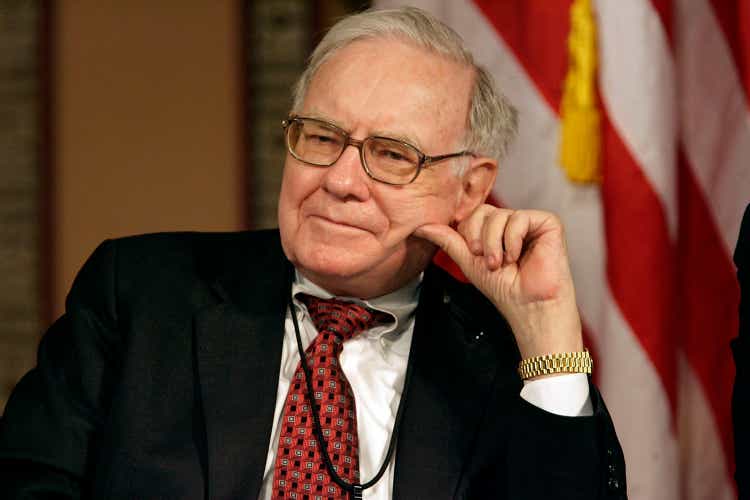
Chip Somodevilla
My last article on Berkshire Hathaway (NYSE:BRK.B)(NYSE:BRK.A) was nearly two years ago when I estimated Berkshire’s intrinsic value was around $315 per class B share, or $472,500 per class A share. Since publication, shares are 27% higher versus 4% for the S&P 500. Today, using a similar valuation methodology, my intrinsic value estimate is slightly over $360 or $540,000 for B and A shares, respectively. At the current B share price of $290, this represents 24% upside to fair value. More importantly, I feel that the current price helps limit downside risk/permanent impairment of capital as I contend investors are only paying around 10x earnings for Berkshire non-insurance operating companies, with much of these earnings derived from relatively stable businesses with wide economic moats such as utilities and railroads. Below I will overview my valuation methodology and estimates.
Non-Insurance Operating Businesses
I currently estimate that Berkshire’s non-insurance operating businesses have after-tax earnings power of ~$25.5 billion. This number includes earnings from equity method investees such as Occidental (OXY) and Kraft Heinz (KHC). Although they are publicly traded independent companies, their proportional share of income is included (or soon will be) on Berkshire’s income statement rather than flowing through as a mark-to-market investment value. However, I do not include any insurance underwriting income. My assumption here is that Berkshire’s underwriting is break-even over time. This is likely conservative as the Company has generated underwriting profits in most years with a significant cumulative gain. Finally, I expense interest on holding company debt and debit from the earnings of the equity method investees in my estimates.
| After-tax earnings (Non-insur. Op. Companies) $ billions | 22 Est. | Multiple | Value |
| BNSF | 6.2 | 20 | 124.1 |
| BHE | 3.7 | 20 | 73.3 |
| Manufacturing, service and retail | 12.5 | 15 | 187.5 |
| Equity method earnings, net of holdco interest | 3.1 | 10 | 31.2 |
| Total | 25.5 | 16.3 | 416.1 |
As seen above, I value Berkshire’s operating businesses at $416 billion, or a blended multiple of 16.3x after-tax earnings. You can see the individual business earnings multiples I apply above. In my opinion, some businesses such as BNSF and BHE would likely trade at higher than S&P 500 multiples as independent public companies whereas others such as the Manufacturing, Service and Retail segment would trade at a discount. Regardless, on a blended basis, the implied multiple of 16.3x is slightly lower than the S&P 500 multiple on current year earnings of 17x.
Investments and Excess Cash
At today’s prices, I calculate the fair market value of Berkshire’s domestic equity portfolio is $298 billion. This number excludes KHC, OXY as we have already included their proportional earnings in the value of the operating companies. However, I include the fair market value of OXY preferred stock and warrants and estimated value of stakes in Japan trading houses and BYD (OTCPK:BYDDF)(OTCPK:BYDDY). From this amount, I subtract deferred tax liabilities pertaining to the disclosed $164 billion in unrealized gains on equity securities using the 21% corporate tax rate ($34.4 billion).
| Investments $ billions | |||
| Domestic equities | 292.9 | ||
| Oxy Pref + Warrants | 12.1 | ||
| Japan Trading Houses + BYD (est.) | 11.4 | ||
| Deferred tax liabilities | (34.4) | ||
| Equities, net of DTL | 282.0 | ||
| Excess Cash – Q3-22 | 78.9 | ||
| Fixed maturity | 18.6 | ||
| Total | 379.5 |
Berkshire disclosed $109 billion in cash and T-bills at the end of Q3 2022. However, I don’t think it’s appropriate to call all this cash “excess” as Berkshire’s businesses, particularly insurance and reinsurance, require large amounts of working capital to maintain excellent credit ratings and pay claims in the event of large insurable losses. I define excess cash as $79 billion, which is $109 billion total cash less their disclosed minimum cash holdings of $30 billion. Said another way, this is my estimate of the cash Berkshire could distribute to shareholder via dividends or share repurchases or use to finance earnings growth via acquisitions.
Valuation
In summary, I arrive at a cumulative valuation for Berkshire of approximately $795 billion, or $362 per class B share (543,000/A share). This is comprised of roughly equal parts non-insurance operating businesses ($189/B share) and investments and excess cash ($173/B share).
| Valuation | Value $ billion | Per B Share | Per A Share |
| Non-Insurance Operating Business | 416.1 | $ 189 | $ 284,041 |
| Investments + Excess Cash Net of Deferred Taxes | 379.5 | $ 173 | $ 259,056 |
| Intrinsic value | 795.5 | $ 362 | $ 543,097 |
While my estimates for the earnings power of the operating businesses could prove wrong or decline in future years, I believe there is a robust margin of safety at the current price. I say this because I calculate investors are currently only paying around 10x earnings for Berkshire’s operating businesses. Berkshire’s current market capitalization is $637 billion, yet we have shown that equities, bonds, and excess cash – net of taxes – are worth $380 billion. Therefore, the residual value of $257 billion is only 10x our estimate for the after-tax operating earnings of $25.5 billion. Of course, operating earnings could deteriorate in future years, or the investment portfolio could lose significant value, but the present discounted multiple should help to cushion those potential impacts. On the other hand, investors could benefit handsomely if earnings power increases, the value of investments appreciate, or management shrewdly allocates their excess capital and incremental free cash flow – all of which present management has a long history of achieving.


Be the first to comment